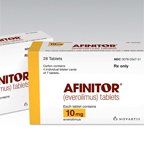FDA Approves Everolimus (Afinitor) for Metastatic Breast Cancer
The FDA approved the mTOR inhibitor everolimus (Afinitor) last week for use in postmenopausal women with HER2-negative, hormone-receptor-positive advanced breast cancer patients.
The US Food and Drug Administration (FDA) approved the mTOR inhibitor everolimus (Afinitor) last week for use in postmenopausal women with HER2-negative, hormone-receptor–positive advanced breast cancer patients. Afinitor was approved in combination with exemestane (Aromasin) in those patients whose cancer progressed following treatment with letrozole or anastrozole.

Source: Novartis
Approximately 220,000 women are diagnosed with hormone-receptor–positive breast cancer annually throughout the world, making it the most common form of breast cancer.
Postmenopausal women with estrogen-receptor–positive breast cancer are a large segment of all breast cancer patients. Most are treated with letrozole or other aromatase inhibitors, which block the activity of aromatase enzymes. These enzymes normally facilitate conversion of androgens to estrogens. Therefore, aromatase inhibitors block the production of estrogen, depriving tumor cells of one of their growth factors. Unlike tamoxifen, which blocks the estrogen receptor in the ovaries, aromatase inhibitors work well only in postmenopausal women, whose source of estrogen is via peripheral tissues such as the fat tissue in the breast.
New options are needed for postmenopausal patients initially treated with aromatase inhibitors as not all women respond to this first-line treatment, and even those who do respond will likely relapse. Before the approval of everolimus, second-line treatment options were other steroidal and nonsteroidal aromatase inhibitors as well as estrogen-receptor antagonists such as fulvestrant (Faslodex) and tamoxifen.
The BOLERO-2, phase III trial that led to approval increased the time women respond to endocrine therapy. The trial results are published in the New England Journal of Medicine. The premise of the 724-patient, randomized trial was to test whether blocking the phosphatidylinositol 3-kinase (PI3K)–Akt–mammalian target of rapamycin (mTOR) pathway would result in prolonged progression-free survival.
Signaling through the mTOR pathway had been previously identified as a mechanism of resistance to endocrine therapy in breast cancer. Research suggests that there is significant cross talk between the estrogen-receptor pathway and the mTOR pathway. Preclinical studies combining everolimus and aromatase inhibitors resulted in synergistic blockage of proliferations and increased cell death. The BOLERO-2 phase II trial suggested more robust activity of the everolimus plus letrozole combination compared to letrozole alone in estrogen-receptor–positive breast cancer patients.
The phase III trial demonstrated a 4.6-month improvement in progression-free survival in those women given the combination treatment compared to exemestane alone (7.8 months vs 3.2 months; P < .0001).
The Committee for Medicinal Products for Human Use of the European Medicines Agency provided a positive opinion of the combination therapy, and the combination is being reviewed by other global health authorities.
This is the fifth indication for everolimus. The drug is also approved as second-line therapy for advanced renal cell carcinoma and for locally advanced, metastatic, or unresectable progressive neuroendocrine tumors of pancreatic origin, as well as two other indications.